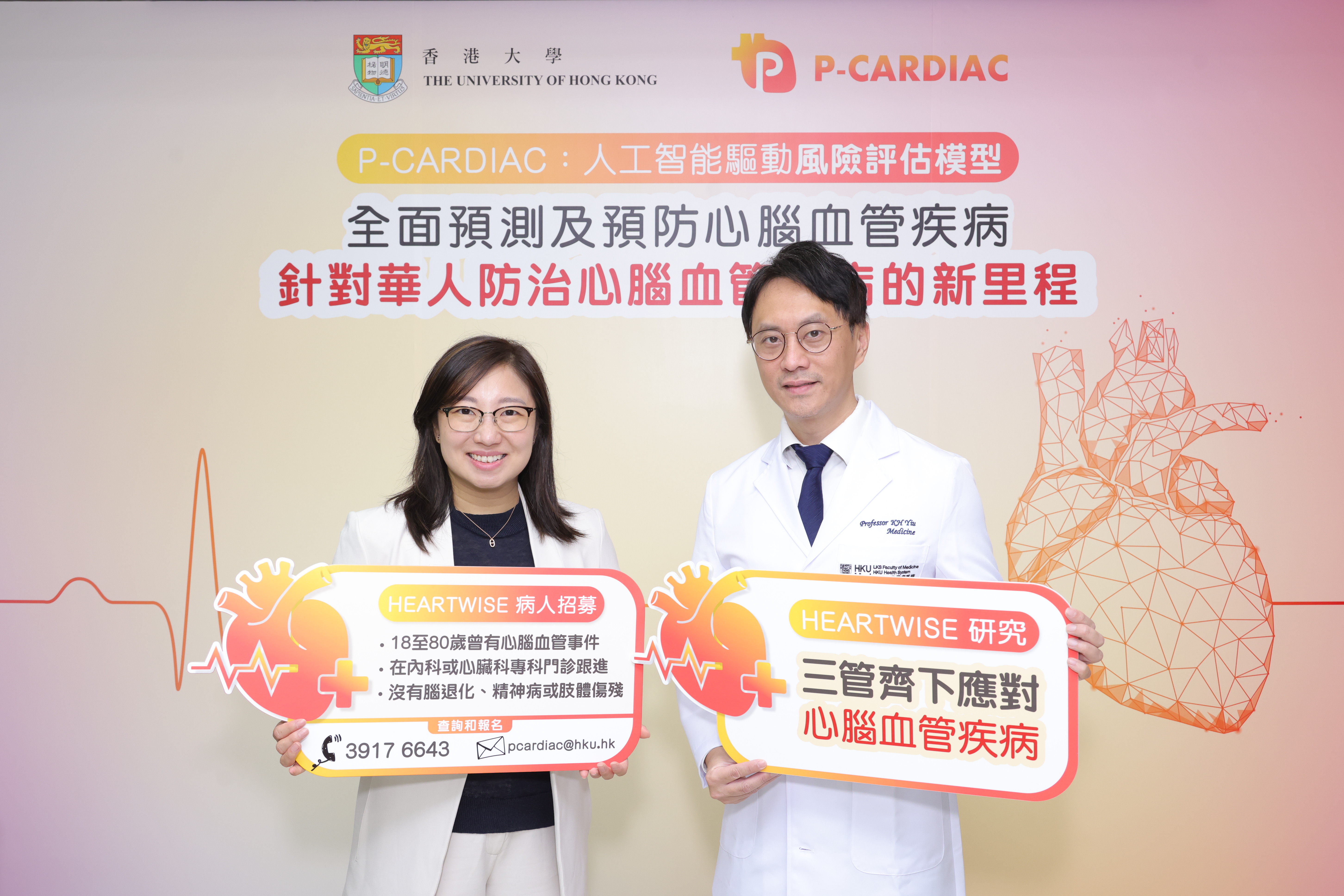P-CARDIAC: AI powered risk prediction tool to predict and prevent cardiovascular event across all levels of care for patients with cardiovascular diseases
A Crucial Milestone in the Fight Against Cardiovascular Disease in Chinese Population
HONG KONG SAR - Media OutReach Newswire - 22 September 2024 - A groundbreaking AI-powered risk prediction tool is poised to revolutionize the prevention and management of cardiovascular disease (CVD) within the Chinese population. Professor Celine Chui Sze-ling, Assistant Professor of the School of Nursing and the School of Public Health, LKS Faculty of Medicine, The University of Hong Kong, will lead the research utilizing the innovative Personalized CARdiovascular DIsease risk Assessment for Chinese (P-CARDIAC) model. This AI-driven tool is specifically designed to predict CVD risk in Chinese individuals. The effectiveness of P-CARDIAC will be evaluated in the HEARTWISE study, focusing on its application in secondary care for cardiovascular patients.
A Critical Challenge: CVD in Hong Kong and Beyond
Professor Yiu Kai-hang, Clinical Professor, Cardiology Division, Department of Medicine, LKS Faculty of Medicine, The University of Hong Kong, states, "Cardiovascular disease remains a leading cause of death globally, claiming an estimated 20.5 million lives annually. The burden of CVD is particularly pronounced in Asia, where 58% of these deaths occur. In Hong Kong, cardiac and cerebrovascular diseases consistently rank among the top five causes of death, highlighting the urgent need for effective prevention and management strategies."
A Personalized Approach to CVD Prevention
P-CARDIAC, developed by a team of multidisciplinary researchers at The University of Hong Kong, is a game-changer in cardiovascular disease (CVD) risk assessment. This AI-powered tool, trained on a vast dataset of patient records from the Hong Kong Hospital Authority, incorporates over 120 risk factors to provide personalized risk scores for each patient. By considering their unique characteristics and medical history, P-CARDIAC offers a comprehensive and nuanced assessment of CVD risk.
HEARTWISE: A Three-Pronged Approach for Combating Cardiovascular Disease Burden
The HEARTWISE study, using the P-CARDIAC model, will take a three-pronged approach to investigate the effectiveness of secondary prevention strategies:
- Mapping P-CARDIAC Scores with CVD Outcomes: The study will analyze electronic health records and patient-reported symptoms to determine the correlation between P-CARDIAC scores and various factors, including prescriptions and upcoming specialty follow-up appointments. This analysis will help researchers understand how effectively P-CARDIAC predicts actual CVD outcomes and identify potential early warning signs.
- Determining P-CARDIAC Risk Thresholds: The study will compare P-CARDIAC scores with clinical judgments from healthcare professionals to establish clear risk thresholds for different levels of CVD risk. This will help provide a more accurate and convenient reference to the healthcare professionals and enable the development of tailored management protocols for patients based on their individual risk profiles.
- Comparing CVD Outcomes between Standard Care and Pharmacist-led Services: The study will compare the CVD outcomes of patients receiving standard care with those who receive pharmacist-led services, the latter includes long-term medication management and follow-up provided to patients by pharmacists, working collaboratively within an interdisciplinary team consisting of cardiologists, nurses, and pharmacists. This will assess the potential benefits of pharmacist-led interventions in improving CVD outcomes.
A Collaborative Effort for a Healthier Future
The HEARTWISE study, which involves collaboration among researchers, healthcare professionals, and community partners, will recruit over 3,000 patients from six public hospitals across Hong Kong (including Queen Mary Hospital, Queen Elizabeth Hospital, Kwong Wah Hospital, Princess Margaret Hospital, Tuen Mun Hospital, and Pok Oi Hospital) beginning in the fourth quarter of 2024. This initiative, expected to last about two years, aims to generate a robust dataset for comprehensive analysis.
Professor Celine Chui emphasizes, "HEARTWISE represents a significant step forward in our understanding of CVD prevention and management in Chinese populations. By leveraging the power of P-CARDIAC and a multidisciplinary approach, we aim to identify effective strategies for reducing the burden of CVD in Hong Kong and beyond."
Beyond Hong Kong: A Global Impact
HEARTWISE, a groundbreaking study led by The University of Hong Kong, is poised to revolutionize cardiovascular disease (CVD) prevention and management in Chinese populations.
"By leveraging P-CARDIAC's personalized risk assessment capabilities and a multidisciplinary approach, HEARTWISE aims to identify effective strategies for reducing the burden of CVD in Hong Kong and beyond. The ultimate goal is to incorporate P-CARDIAC into routine clinical practice, leading to improved cardiovascular health outcomes for millions." commented by Professor Yiu Kai-hang.
This study will have a significant impact on multiple stakeholders, including patients, caregivers, healthcare providers, and payers. The findings have the potential to improve CVD risk assessment, enhance primary and secondary prevention strategies, promote personalized healthcare, explore the benefits of pharmacist-led services, and inform public health policy aimed at reducing the incidence and impact of CVD in Hong Kong and other Asian populations.
Pilot Study: P-CARDIAC Application in District Health Centre Setting
In addition to the HEARTWISE study, which focuses on secondary care for cardiovascular disease, a pilot study has been launched in a primary care setting in collaboration with the Hong Kong Society of Rehabilitation (HKSR) at the District Health Centre and a community pharmacy.
The aim of the pilot study is to enhance medication adherence and reduce cardiovascular disease (CVD) risk among patients. This initiative, conducted in collaboration with DHC/E in the Central Western District, a community pharmacy and the Cardiology Outpatient Clinic at Queen Mary Hospital, utilizes the innovative P-CARDIAC model developed by The University of Hong Kong. The primary objective is to empower patients with chronic conditions, such as stroke, post-acute myocardial infarction (Post-AMI), diabetes, and hypertension, by providing targeted medication education and support to improve their self-management skills.
Preliminary results indicate that over 90% of patients experienced a change in their P-CARDIAC score by the second visit, two months after the first. Of the 20 recruited patients, 15 had follow-up visits, and 80% reported an improved understanding of their CVD risk, which contributed to improve better health outcomes and enhanced medication utilization.
This initiative highlights the crucial role of pharmacists in managing CVD risk through a multidisciplinary, patient-centered care approach. By using P-CARDIAC, pharmacists can address barriers to medication adherence and motivate patients to visualize the benefits of their treatments. With a goal to train 10 volunteers and benefit 100 patients annually, the pilot study represents a significant step towards enhancing community-based healthcare services in the region, ultimately alleviating the healthcare burden and reducing public health costs associated with chronic disease management.
Recruitment for Patients with Cardiovascular Diseases (Limited Spots Available)
The University of Hong Kong has developed the city's first AI-driven risk prediction model for cardiovascular diseases, specifically designed for the Chinese population—referred to as the "Personalized CARdiovascular DIsease risk Assessment for Chinese" (P-CARDIAC) model. This model predicts the risk of patients experiencing cardiovascular events over the next 10 years. The research team is currently recruiting eligible patients to explore the feasibility of implementing P-CARDIAC for managing cardiovascular diseases in public hospitals.
Research Procedure:
- The research team will obtain individual clinical data.
- This data will be used for P-CARDIAC cardiovascular event risk assessment.
- → This will assist doctors in planning management strategies for cardiovascular diseases.
Eligibility Criteria:
- Aged 18 to 80 with a history of cardiovascular events (e.g., peripheral artery disease, coronary artery disease, myocardial infarction, stroke, or previous vascular reconstruction surgeries such as bypass or angioplasty).
- Under follow-up care in a general medicine or cardiology outpatient clinic.
- No cognitive decline, mental illness, or physical disabilities.
Ethics Committee Approval Number: CIRB-2024-240-3
Hashtag: #P-CARDIAC #PersonalizedCARdiovascularDIseaseriskAssessmentforChinese #AI #HEARTWISE #Cardiovasculardiseases #HKULKSFacultyofMedicine #SchoolofNursing #SchoolofPublicHealth #ProfessorCelineChuiSze-ling
The issuer is solely responsible for the content of this announcement.
About P-CARDIAC and HEARTWISE Study
The P-CARDIAC initiative represents a significant advancement in cardiovascular risk assessment tailored specifically for the Hong Kong population. Developed through a collaborative effort between academic institutions and healthcare partners, P-CARDIAC utilizes machine learning to provide personalized 10-year cardiovascular risk predictions for individuals with established acute coronary syndrome. The HEARTWISE study aims to validate the clinical utility of P-CARDIAC in real-world settings, ensuring that healthcare providers can effectively utilize this tool to enhance patient outcomes. By integrating pharmacist-led services into the management of cardiovascular conditions, HEARTWISE seeks to alleviate the burden on healthcare systems while improving the quality of care for patients.
The P-CARDIAC model represents a significant collaboration among key stakeholders aimed at improving cardiovascular risk assessment in Hong Kong. This initiative is led by principal investigator, Professor Celine Chui Sze-ling, Assistant Professor of the School of Nursing and the School of Public Health, LKS Faculty of Medicine, The University of Hong Kong, and co-principal investigator, Professor Ruibang Luo, Associate Professor of the Department of Computer Science, Faculty of Engineering, The University of Hong Kong.
The development of P-CARDIAC was supported by the Innovation and Technology Fund of the Innovation, Technology and Industry Bureau, with matching fund from Amgen Hong Kong, an international biopharmaceutical company focusing on developing pipeline medicines to address unmet medical needs while leveraging state-of-the-art science to drive solutions that improve health outcomes.
With the use of P-CARDIAC, the HEARTWISE study benefits from the active involvement of six hospitals under the Hong Kong Hospital Authority, which facilitate real-world implementation, data collection and comprehensive data analysis. Together, this study symbolizes a multidisciplinary collaboration to commit advancing innovative and evidence-based strategies to address the rising burden of cardiovascular diseases.



















